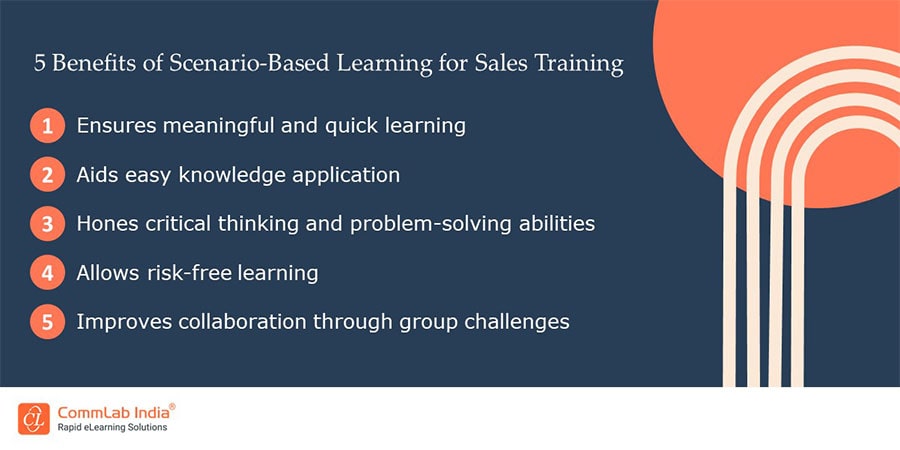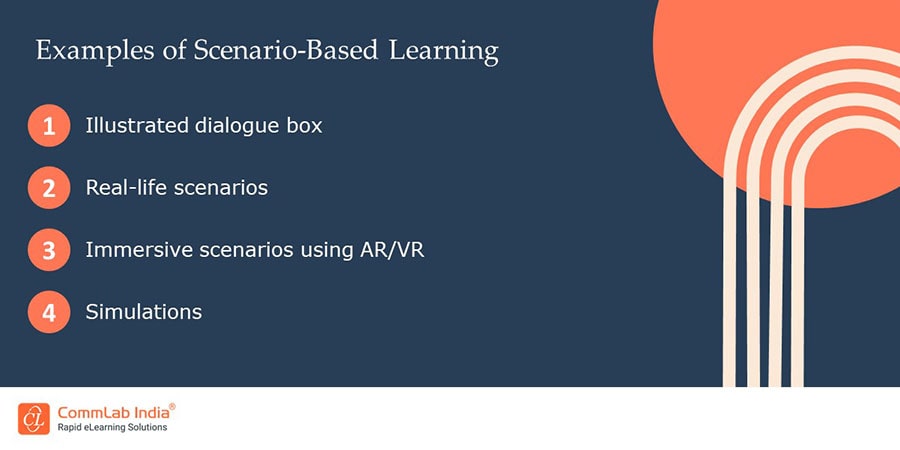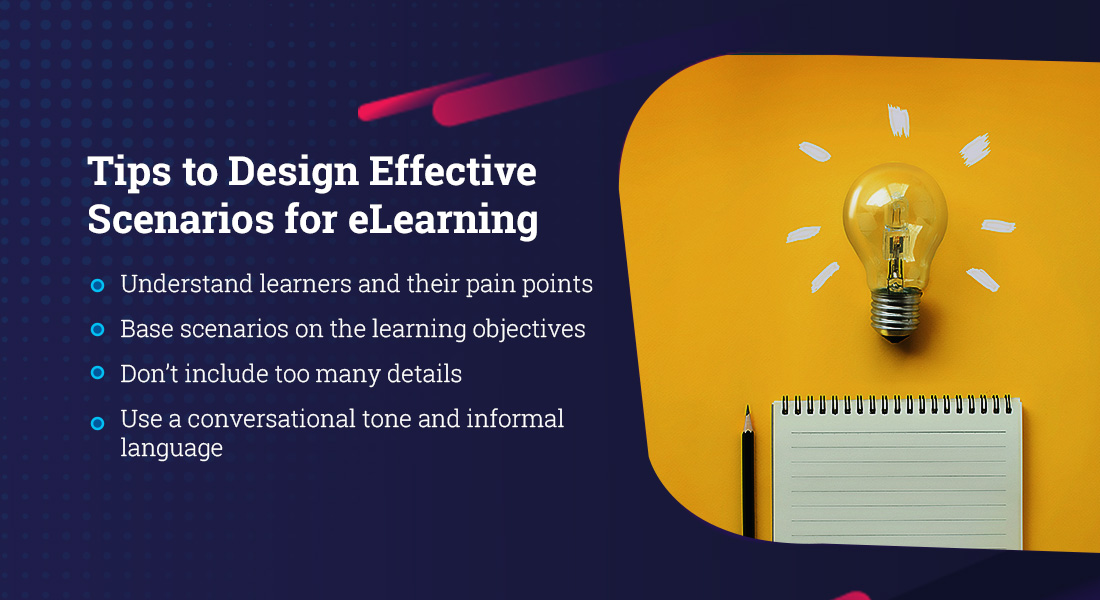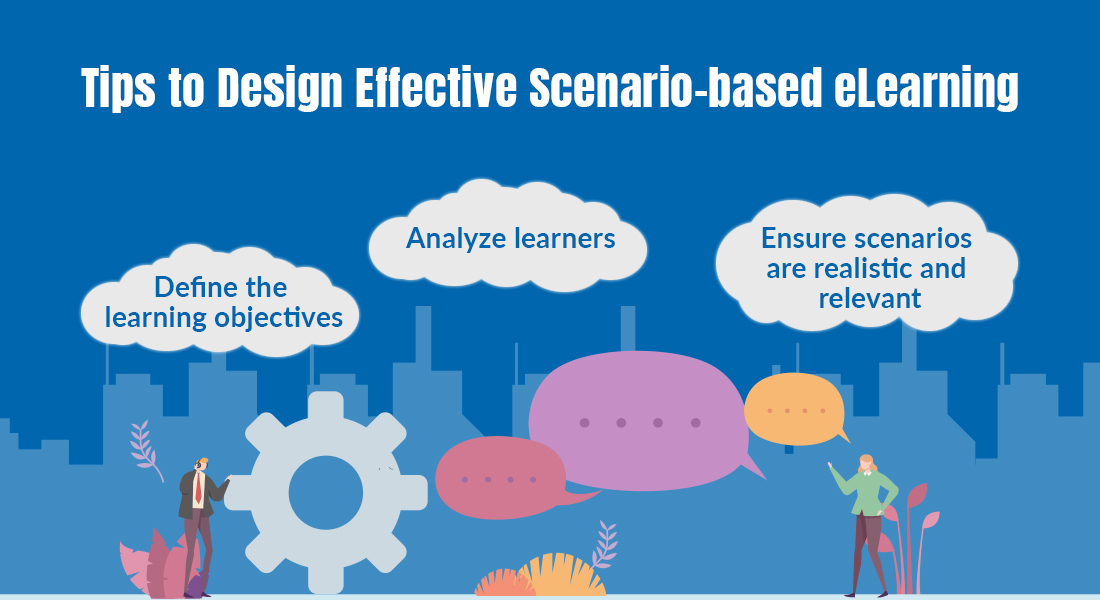A Deep Dive Into Scenario-Based Learning Strategies for Sales Training
Scenarios offer experiential learning and boost learner confidence. Read the blog to explore how scenario-based learning is ideal for sales training.

Not every skill can be learned by reading articles and eBooks or attending webinars and workshops. Some need exposure to real-life situations for meaningful learning. Especially, when it comes to your sales team who face new and unpredictable circumstances day in and day out. Every case is unique — be it convincing a customer to buy a new product, answering a customer query regarding the functionality of a newly added feature to an existing product, or handling critical customer objections. How to equip your sales team to cater to these diverse scenarios confidently? Well, what better than scenario-based learning? This blog walks you through the benefits and use cases of scenario-based learning in sales training. Get, set, dive!
Scenario-Based Learning is an Ideal Fit for Sales Training
You can use scenarios for:
- Product training
- Sales process training
- Communication skills training
- Training on handling customer queries and objections
Read on to explore in detail.
Why Should You Say Yes to Scenario-Based Learning for Sales Training?
For those who are new to the concept, scenario-based learning is an instructional approach that delivers learning through various scenarios that mimic real-life situations. Upon exposure to these scenarios, learners are expected to think critically and analyze the situation to make suitable decisions to solve a problem.
Well, let’s explore how it is one of the most effective instructional approaches to conduct sales training. Here are a few key reasons:

-
Ensures Meaningful and Quick Learning
Context-rich and realistic scenarios involve learners in the content and ensure meaningful and quick learning. When you present an interesting scenario that entails relatable characters, learners see themselves as the characters presented and are motivated to perform actions to solve the existing problem. This ensures a better understanding of the delivered concept and leads to longer retention. -
Aids Easy Knowledge Application
Scenarios provide a hands-on experience to your learners. They offer them the scope to learn by doing themselves and this helps them apply their learning easily when they face such scenarios in their day-to-day work. -
Hones Critical-Thinking and Problem-Solving Abilities
Exposing your learners to complicated scenarios that they are most likely to encounter, challenges them to brainstorm and think critically to find feasible solutions to the existing problems. Exposure to such challenging scenarios not only develops their analytical and problem-solving skills but also equips them with better decision-making abilities in real-life situations. -
Allows Risk-Free Learning
Scenario-based simulations are a fantastic way to allow learners the scope to make mistakes and learn from them in a controlled risk-free environment. Learners enjoy a safe space to learn without the fear of mistakes or failures. This lessens the scope of errors in actual work scenarios and saves businesses from any probable losses. -
Improves Collaboration
Scenario-based learning that involves group challenges encourages peer-to-peer learning. These group activities require learners to do collective brainstorming and enable them to understand and learn each other’s perspectives and come up with the most viable solutions to the problem.
→ Download Case Study — Microlearning for Sales Training
Scenario-Based Learning for Effective Sales Training — Use Cases
Sales training is crucial. After all, businesses need to make sales to earn profits. Sales training is comprehensive. It is much more than training your sales team on the features and functionalities of new products. Let me walk you through the various use cases of scenario-based learning in sales training:
1. Product Training
Product training is essential for every organization. Gone are the days when sales reps were handed over hefty product manuals or eBooks to mug up the features and functionalities of new products to make sales. Times have changed. In today’s world, sales is about understanding the customer’s needs and offering the best possible solution.
Every customer is unique and so are their needs. Your sales reps not only should know about the features and functionalities of your products but also should understand how to pitch the right product. Scenarios help train your sales reps to understand different customer needs and pitch the right product that best suits them.
Watch this video to discover how online product training elevates your sales margin.
2. Sales Process Training
This is crucial for the newly hired sales reps who are fresh out of college. They should be walked through the various steps of the sales cycle to close deals without hassles. But is it just all? Knowing the process and executing it without errors comes with practice. Scenario-based learning can work wonders.
You can plan scenarios in your course to check learners’ understanding of the sales process. Ask them to identify a missing step or a wrong step in the sales process. Questions can be framed to seek explanations for what the possible consequences of the missed or wrong step could be, what could have been done instead, and what corrective measures could be taken to resolve the issue. This would caution the sales reps for real-life scenarios and also prepare them to counter such situations in case they happen.

3. Communication Skills Training
Good communication skills are essential to sealing good deals. Sales reps need to strike up meaningful conversations with the clients to understand their needs. They need to make presentations to explain the unique features and functionalities of the product and persuade the client for the final purchase.
Scenarios are a fantastic way to provide learners with hands-on experience. You can plan for group activities wherein different groups of learners are given different situations. It could be handling a complicated customer need or facing a customer who is reluctant to make a purchase. The groups can be asked to make online presentations sharing tips and to-dos to sort the issue and seal the deal.
4. Training on Handling Customer Queries and Objections
Customer is king and delighted customers are your assets. So, your role doesn’t end at making the sale, it goes beyond. Post-sale service is crucial to ensure repeat customers and adds to your loyal customer base. So, training your sales team to handle customer queries and objections efficiently is something you can’t overlook.
Scenario-based learning can help your sales reps learn the art of handling critical customer objections efficiently. Call them to enact a role play in case you have managed to assemble your sales reps for a classroom session. You can also convince your senior sales managers and sales heads to create audio and video podcasts wherein they share their war stories and experience of persuading disgruntled customers to land the sale. Branching scenarios in an eLearning course that present chaotic customer encounters can be effective in providing learners with practical experience in handling such situations at work and improving their problem-solving abilities.
Amp Up Your Sales Team’s Performance with Scenario-Based Learning
Every customer is unique and so should be the way to handle them. No wonder your sales team needs to have a dynamic approach and be agile to handle customers as per the situation to fix the deal. Scenario-based learning is an ideal fit for training your sales force as it offers ample scope for practice and boosts the confidence of your sales reps. It also hones the critical thinking and problem-solving abilities of your team enabling them to make smart and apt decisions to seal profitable deals and build customer rapport.
Microlearning is another useful instructional approach for impactful sales training. Read this customer success story to get a glimpse of microlearning for sales training for a pharma major. Trace the journey now!





